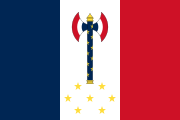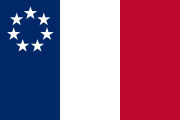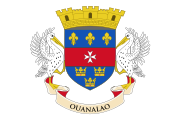French colonial flags
French Empire Empire français | |
|---|---|
 Flags were used to represent various territories and colonies across the Empire |
| List of French flags |
|---|
 |
Some of the colonies, protectorates and mandates of the French Colonial Empire used distinctive colonial flags. These most commonly had a French Tricolour in the canton.
As well as the flags of individual colonies, the governors-general of French colonies flew a square flag with a blue field and the French ensign in the canton. This flag was flown beneath the national ensign. Colonial governors used a rectangular swallow-tailed version of this flag.
Colonial flags with a tricolour canton
[edit]The flags with the French flag in the canton, which on many occasions were already existing flags without the tricolour, resembled the British colonial flags, which originated as defacements of the British ensigns, which have the British Union Jack in the canton, and a red, white or blue fly. Naval sources show flags such as those used in the French Mandate of Syria as having the tricolour with unequal stripes, as in the French ensign, but it is likely that these versions of the flags were used at sea, and on land the tricolour had the standard equal stripes.
While for the sake of simplicity French colonial ensign are on this page classified by appearance, this should not be taken to imply common origins or the existence of undefaced ensigns used by the French government unless otherwise noted.
Red field
[edit]- Laos, French Indochina: Laos was part of French Indochina from 1893. The tricolour was added to the flag of the Kingdom of Luang Prabang, which was red with a white image of a three headed elephant on a stand with a parasol.
- Morocco: The Protectorate of Morocco from 1919 to 1953, used the national flag with a tricolour in the canton as a civil ensign.
- Tunisia: From 1881 to 1956, Tunisia was a French protectorate. It has been reported that the tricolour was added to the Tunisian flag for use as a civil ensign, as in Morocco, but it seems that such a flag was never official.
- Wallis and Futuna: The unofficial, but commonly used flag of Wallis and Futuna is red with four white triangles arranged in a square and the tricolour in the canton with a white fimbriation.
Blue field
[edit]- Damascus: This part of the French Mandate of Syria from 1922 to 1925 used a blue flag with a white disk in the centre and the tricolour in the canton.
- Syria (1920): The French Mandate of Syria may have originally used a sky blue flag with a white crescent and star and French tricolour in the canton.
- In 1939, the governor-general's flag, was a square blue flag with a French ensign in the canton. With a swallow-tail, this flag was the colonial governors' flag.
White field
[edit]
- Aleppo: This part of the French Mandate of Syria from 1920 to 1925 used a white flag with tricolour in the canton and three yellow five-pointed stars in a triangle in the fly.
- Latakia: This part of the French Mandate of Syria used a white flag, ratio 2:3, with the tricolour in the canton taking up 1/9 of the area of the flag, red triangles in the other three corners, and a golden sunburst in the centre of the flag.
- The first banner of the French Revolution had a white field with a tricolour in the canton, although the order of the colours has since been reversed.
Green field
[edit]- Togo: The flag used in 1957–8 had two white five-pointed stars in the green field, one at the lower left-hand corner, the other in the upper right-hand corner.
Yellow field
[edit]
- Annam, part of the Union of French Indochina from 1886 until 1954, used a flag with a plain yellow background, in two shapes one with the ratio 2:3 and the other 1:1 (square).
Multicolour field
[edit]- Jebel Druze. From 1924 until 1936, this part of the French Mandate of Syria had a flag with a white vertical strip beneath the tricolour in the canton, with the rest of the flag made up of green, red, yellow, blue and white horizontal stripes.
- Syria: In 1922, the French Mandate was made a federation, with a federal flag made up of green-white-green horizontal stripes and the tricolour in the canton. This flag was also used when Aleppo and Damascus merged.
Colonial flags with other designs
[edit]
Modified tricolours
[edit]- Lebanon: The French Mandate of Greater Lebanon (1920–43) used as a flag the French tricolour with a green cedar in the middle stripe. See picture in Flag of Lebanon § History.
Other designs
[edit]- French Polynesia: The flag of French Polynesia has the horizontal stripes, red-white-red. The white stripe is twice the height of each red stripe, and contains an emblem consisting of a boat, the sun, and waves.
Galleries
[edit]Historical flags
[edit]-
Flag of Annam, part of French Indochina (1923–1945)
-
Flag of Laos, part of French Indochina (1893–1953)
-
Flag of Cambodia, part of French Indochina (1863–1948)
-
Flag of the Imamate of Futa Jallon (1896-1912)
-
Flag of the Autonomous Republic of Togo (1957–1958)
-
Flag of the French Senegal (1958-1959)
-
Flag of French Equatorial Africa (1910–1958)
-
Flag of Gabon (1959–1960)
-
Flag of the Upper Volta (1959–1984)
-
Flag used by some military units in the French protectorate of Tunisia (1881–1956)
-
Flag of the French Mandate of Syria (organized into five states (Sanjak of Damascus, Sanjak of Aleppo, Alawite State, Sanjak of Latakia, the Jebel Druze, Greater Lebanon) (1920–1922)
-
Flag of the Syrian Federation (1922–1924) and later State of Syria (1924–1930)
-
Flag of the State of Alawites, later Sanjak of Latakia, in the French Mandate of Syria (1920–1936)
-
Flag of the State of Aleppo, in the French Mandate of Syria (1920–1924)
-
Flag of the State of Damascus, in the French Mandate of Syria (1920–1924)
-
Flag of Jabal ad-Druze, in the French Mandate of Syria (1924–1936)
-
Flag of Madagascar, in the French Protectorate (1885–1895)
-
French Merchant Flag in the French Morocco (1919–1956)
-
Flag of Vanuatu under the Anglo-French Joint Naval Commission (1887–1906)
-
Flag of Tahiti under the Protectorate of France (1842–1880)
-
Flag of the State of Greater Lebanon during the French mandate (1920–1946)
-
Flag of the Tai Dón people (1944–1953)
-
Flag of the Montagnard country of South Indochina (1946–1950)
-
Flag of the Tai Autonomous Territory (1946–1950)
-
Flag of the Sip Song Chau Tai (1950–1955)
-
Flag of the Tay people (1947–1954)
-
Flag of the Nùng Autonomous Territory (1947–1954)
-
Flag of the Muong Autonomous Region (1948–1954)
-
Flag of the French Protectorate of Wallis and Futuna (Uvea) (1860–1886)
-
Flag of the French Colony of French Sudan (1892–1959)
-
Proposed Flag of the French Congo (1959)
-
Flag of the French protectorate of Saar (1947–1956)
-
Flag of the French protectorate of Rurutu in French Polynesia (1889–1900)
-
Flag of a French Governor
-
Flag of French protectorate of Rimatara, part of French Polynesia (1891–1900)
-
Flag of French Protectorate of Raiatea, part of French Polynesia (1880–1897)
-
Algerian ensign under the French rule (1848–1910)[1]
-
Flag of French Governor General Pélissier (1848–1854)
-
Car's flag of Governor-General of Algeria Jacques Soustelle (1955–1956)
-
Flag of Ain-Sefra and the vehicle flag of General Laperrine (French Algeria)
-
Flag of French Protectorate of Wallis and Futuna (1886–1887)
-
Flag of French Protectorate of Wallis and Futuna (1887–1910)
-
Flag of French Protectorate of Wallis and Futuna (1910–1958)
-
Flag of French Protectorate of Wallis and Futuna (1958–1985)
-
Flag of the French Society of Sea Works (1896–1935)
-
French Society of Strasbourg to Rhine Navigation
-
Flag of the Administrator of the French Southern and Antarctic Lands (1958–2005)
-
Flag of the French Capitancy of Santo-Domingo (1804-1815)
Flags with French history
[edit]-
Flag of Acadia
-
Flag of the Franco-Americans
-
Flag of the Franco-Albertan
-
Flag of the Franco-Newfoundlander
-
Flag of the Acadians in New England
-
Flag of the Acadiana
-
Flag of the Franco-Columbian
-
Flag of the Franco-Manitobains
-
Flag of the Franco-Ontarians
-
Flag of Franco-Ténois
-
Flag of the Franco-Yukonnais
-
Flag of Fransaskois
-
Flag of Franco-Nunavois
-
Flag of the Autonomous Albanian Republic of Korçë
-
Flag of the Rassemblement Wallonie France
-
Flag of Free France
-
Personal standard of Marshal Philippe Pétain as "Chief of State" of Vichy France
-
Flag of Pied-noir (2008–)
-
Unofficial flag of "French of Algeria" (Pied-Noir)
-
Flag of Louisiana in 1861
-
Flag of Free Republic of Vercors
-
Armband used by the Forces françaises de l'Interieur
-
Flag of French Maquis of Sylla
-
Flag of state of Minnesota with the French motto "L'Étoile du Nord" (1983–2024)
-
Flag of Alliance-Française de Chicago students
-
Flag of the City of Detroit
-
Flag of Baton Rouge, Louisiana
-
Flag of Republic of Independent Guyana (1886–1887)
Current official and unofficial flags of French overseas regions, collectivities, and territories
[edit]Current subnational flags of overseas collectivities and territories
[edit]-
Flag of Alo
-
Flag of Sigave
-
Flag of the Uvea
-
Flag of the Leeward Islands
-
Flag of the Tuamotu Archipelago
-
Flag of Rapa (French Polynesia) (nowadays)
Other official flags
[edit]-
Jack of the Minister of Overseas France
-
Ensign using by the French aircraft carrier Charles de Gaulle (R91)
-
Jack of the President and the Prime Minister
-
Jack of the Minister of Defence
-
Jack of the chief of staff of the Armies
-
Jack of the chief of staff of the Navy
-
Jack of an admiral
-
Jack of a Vice-amiral d'escadre
-
Jack of a vice-amiral
-
Jack of a contre-amiral
-
Jack of a capitaine de vaisseau commanding a division
-
Jack of a capitaine de vaisseau commanding a unit
-
harbour commanding officer (in NATO operations, the "Starboard" is used)
-
senior merchant navy Captain (if no French warship is present)
-
Ensign of French's Customs vessels
-
Flag of the Société Nationale de Sauvetage en Mer
See also
[edit]References
[edit]This article includes a list of references, related reading, or external links, but its sources remain unclear because it lacks inline citations. (May 2016) |
- F.E. Hulme, The Flags of the World: Their History, Blazonry, and Associations, From the Banner of the Crusader to the Burgee of the Yachtsman; Flags National, Colonial, Personal; The Ensigns of Mighty Empires; the Symbols of Lost Causes (Colonial Edition), Frederick Wayne and Co., London, pp. 152, (1895).
- W.J. Gordon, Flags of the World Past and Present: Their Story and Associations, Frederick Wayne and Co., Ltd., London, pp. 265, (1929).
- B. McCandless, and G. Grosvenor, "Our Flag Number", The National Geographic Magazine, National Geographic Society, Washington, D.C., Vol. XXXII, No. 4, pp. 420, October, (1917).
- G. Grosvenor, and W.J. Showalter, "Flags of the World", The National Geographic Magazine, National Geographic Society, Washington, D.C., Vol. LXVI, No. 3, pp. 338–396, September, (1934).
- Flags of All Nations Volume I. National Flags and Ensigns (B.R.20(1) 1955), Her Majesty's Stationery Office, London, (1955).
- Flags of All Nations Volume II. Standards of Rulers, Sovereigns and Heads of State; Flags of Heads of Ministries, and of Naval, Military, and Air Force Officers (B.R.20(2) 1958), Her Majesty's Stationery Office, London, (1958).
- Flags of All Nations Change Five (BR20), Her Majesty's Stationery Office, London, (1989), Revision (1999).
- W. Smith, Flags Through the Ages and Across the World, McGraw-Hill Book Co., Ltd., Maidenhead, England, pp. 361, (1975).
- J.W. Norie, and J.S. Hobbs, Three Hundred and Six Illustrations of the Maritime Flags of All Nations; Arranged Geographically, with Enlarged Standards: Together with Regulations and Instructions Relating to British Flags &c., Printed for, and Published by C. Wilson, At the Navigation Warehouse and Naval Academy, No. 157, Leadenhall Street, Near Cornhill,(Facsimile reprint of 1848 original), (1987).
- Ottfried Neubecker, Flaggenbuch (Flg.B.). Bearbeitet und herausgegeben vom Oberkommando der Kriegsmarine. Abgesclossen am 1. December 1939, (Historical Facsimile edition containing all national and international flags 1939–1945), pp. 193, (1992).



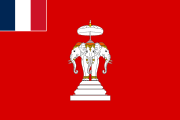






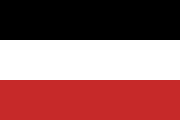


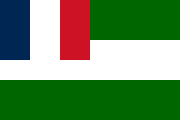
























![Algerian ensign under the French rule (1848–1910)[1]](http://upload.wikimedia.org/wikipedia/commons/thumb/4/46/Naval_ensign_of_French_Algeria_%281848%E2%80%931910%29.svg/180px-Naval_ensign_of_French_Algeria_%281848%E2%80%931910%29.svg.png)



























